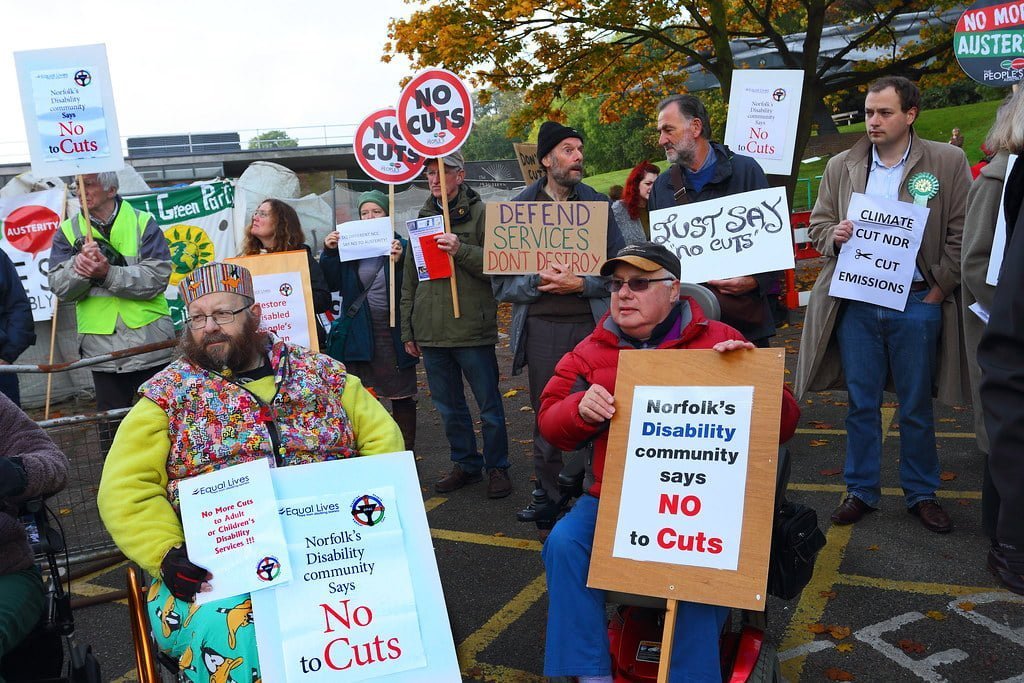The disabled community has been hit hard by the pandemic – left behind by a Tory government that puts profits before lives. Workers and disability activists must unite and fight for a society in the interests of the many, not the few.
According to one survey earlier this year, 60% of people with disabilities have said that they have struggled to access food, medicine, and other necessities during the pandemic. Barriers included a lack of social distancing infrastructure for the visually impaired, or a lack of entry to the ‘extremely clinically vulnerable’ register.
Of those surveyed, 1-in-3 reported increased psychological distress. Respondents cited social isolation, loss of control and agency, and a lack of access to mental health services as factors behind this.
As if this wasn’t enough, approximately 50% claimed that information was inaccessible, with little or confusing advice. As the disabled community are mostly non-internet users, many have even been shut out completely from the government’s (already confusing and contradictory) coronavirus guidance.
In one case, more than 150 hard of hearing people brought a legal class action against the Tory government for failing to provide a British Sign Language (BSL) interpreter at the daily coronavirus briefings.
These injustices are nothing new to the disabled community. Nor are they just an unfortunate consequence of the global pandemic. COVID has exacerbated the prolonged discrimination and suffering endured by disabled communities for decades under capitalism.
Losing support
1-in-4 people in high-risk groups reported that they could not access PPE at the start of the outbreak. “PPE is impossible to get a hold of,” one respondent commented, “and when you can, it’s very expensive.”
Many had their care packages cut or their assessments delayed, with some losing their existing social care support. 83% of parents surveyed were expected to home-school their disabled children.
Members of the disabled community have also faced the burden of increased costs, with extra home food delivery charges and higher energy bills. 25% of disabled workers fear losing their jobs in the pandemic – jobs where they are paid less by the hour than their non-disabled colleagues.
The medical profession has also faced criticism. The National Institute for Health and Care Excellence (NICE) had to rewrite its critical care guidance after recommending that patients with autism spectrum disorder and learning difficulties be scored as high risk for “frailty” – potentially denying some disabled people critical care.
While the NHS faces the pressures of a viral outbreak and years of chronic under-funding, many patients have not had their health needs met.
At a local governance level, the 2020 Coronavirus Act’s easements have allowed local authorities to reduce their duties towards vulnerable people under their jurisdiction.
As Disability Rights UK’s Head of Policy Fazilet Hadi correctly commented: “The government called us vulnerable. The government made us vulnerable.”
#DWP silent as it stops answering questions from Disability News Service@JustinTomlinson @dwppressoffice @Dis_PPL_Protest @blacktriangle1 @NUJ_LFB @HirstPhotos @e_lisney #DisabilityNewsService #Discrimination https://t.co/SaEFnyQOeQ
— Disability News DNS (@johnpringdns) September 17, 2020
Legacy of cuts
The injustices facing the disabled community have been long-standing and deliberate. As disability activist and blogger Jenny Morris puts it:
“It is government policy that makes disabled people vulnerable – vulnerable to being poor, to insecure and inappropriate housing, to mounting debt, to being imprisoned within our own homes because of a lack of support.” [Our emphasis].
Statistics show that the COVID mortality risk in the disabled community is lower once you account for population density, socioeconomic status, home ownership, composition of household, and deprivation of local area.
From benefit sanctions to the infamous Bedroom Tax; from inaccessible infrastructure to the Winterbourne scandal: the disabled community has suffered unrelenting abuse and persecution by a system which values profits over people, and which cannot satisfy society’s needs, thereby leaving the disabled behind.
Needs before profits
The disabled community has a long history of militant action against these injustices. Organisations such as Disabled People Against Cuts have consistently protested against austerity over the last decade.
The interests of disabled people are the same as those of the rest of the working class: to fight the Tory austerity and attacks that have destroyed public services and eroded living standards across the board.
It is therefore vital that disabled activists and workers’ voices are brought to the fore. To do this, the labour movement must join forces with disability campaigns to struggle to defend and improve the conditions of disabled people, workers, and all oppressed layers in society.
Solidarity with disabled people in Parliament demonstrating against cuts during #PMQs #summerofdiscontent pic.twitter.com/4RNJTjHcTq
— Ben Claimant ? #joinaunion (@imajsaclaimant) July 19, 2017
The labour movement must fight for a massive increase in funding for physical and mental health services. This can easily be afforded; the wealth is there – only it sits in the hands of the super-rich. But this means nationalising the banks and finance houses, and expropriating the monopolies.
In addition, our demands should include:
- Training more doctors, nurses, therapists, and other professionals to work in an NHS, which should be run under democratic workers’ control.
- All outsourced and private health services and pharmaceutical corporations to be nationalised, without compensation, and integrated into the NHS.
- An end to the Coronavirus Act easements, benefit sanctions, and other attempts to abandon or punish disabled people. It is the bosses who must pay for this crisis!
- A democratic, socialist, planned economy, sensitive to the needs of all members of society. Disabled people – as with the whole of the working class – need PPE, food, healthcare, not to be patronised by a vicious Tory regime.
It is clear that capitalism cannot provide for the needs of the many, but only for the profits of the few. Only the socialist transformation of society can provide justice for the millions of disabled people worldwide.






